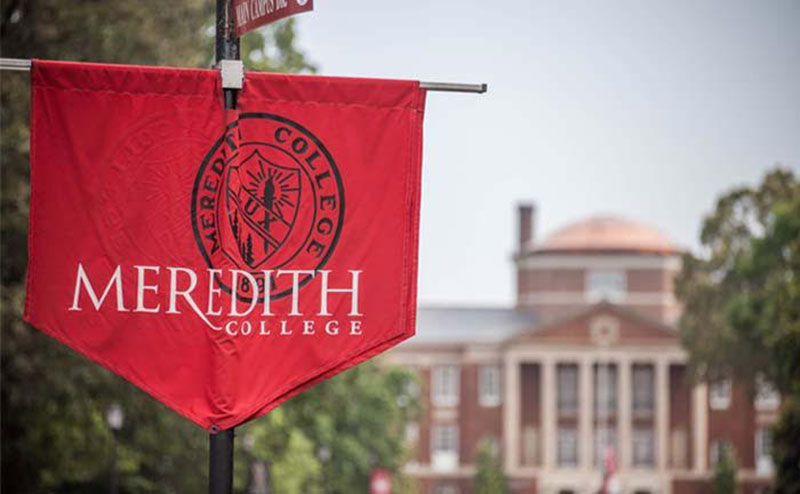Meredith College Offers Unique Classes for Summer 2018
- By Alex Rouch, ’20
- Published

While Meredith College’s campus slows down during the summer, classes are still going strong. There are more than 90 classes being offered in summer 2018 across several departments, giving students the opportunity to continue learning between semesters, earn a few extra credits toward obtaining their onyx, or to explore unfamiliar or unique subjects.
This summer, there are several unique classes in session. In the Department of Art, Assistant Professor of Art Emily Howard is teaching ART-949, Art and Culture of Weaving, which explores both the practice of weaving and its history and social implications.
The course combines research and hands-on projects, encouraging students to study contemporary weavers as well as historical and cultural international weaving traditions. Students gain experience both with the art as well as knowledge of its roots and current uses.
As an alumna, Howard was inspired to teach the class partially because of her own history with weaving at Meredith when it was a regularly offered course, but also wanted to educate Meredith students on the significance of the art form.
“Textile and fiber art is often associated with women and sometimes with a negative or demeaning connotation. I wanted to show 21st century Meredith women that there is and has been a lot of power for women through weaving and textiles,” Howard said. “Weaving is important because it connects to our history as humans. It also teaches many 21st century skills like creativity and imagination, collaboration and teamwork, critical thinking and problem solving.”
Taylor Forzaglia, ’19, is an art education major who enrolled in the class to explore weaving and fell in love with the process.
Forzaglia said, “One thing I have loved about this class is that it is therapeutic. Everything about weaving is process oriented – warping your loom, dyeing fibers, weaving patterns – it’s very relaxing and meditative. Through these processes, you end up with a beautiful textile that can be functional or aesthetic. Weaving has so many applications and endless possibilities.”
In the Department of Sociology and Criminology, Professor of Sociology and Criminology Lori Brown is offering SOC-348, Sociology of Zombies, a class which examines the idea of societal breakdown from a sociological perspective.
The course revolves around a game in which students are assigned an imaginary group of 15 people, including themselves, who are trying to survive the zombie apocalypse. They are required to solve problems and come up with survival strategies, which allow students to explore the sociological aspects of violence, death, and emergency preparedness in a nontraditional way.
Students enrolled in the course read several examples of zombie-centric literature and watch the first two seasons of AMC’s The Walking Dead, the show that inspired Brown to want to teach the course.
“I was fascinated with the idea of what happens in society when the social structure disappears because that is really what The Walking Dead is about,” Brown said. “One of the most interesting parts of the show to me as a sociologist were the issues around social class, race, and gender. There were dynamics around racism and sexism in the small groups and wonderful discussions about ethics in a world with no real laws.”
Though the class deals heavily with sociological theory, the subject matter has real-world implications. Students are encouraged to consider contemporary situations where government has failed, such as in the aftermath of hurricanes, to explore the idea of how people handle a lack of government response during an emergency.
“I hope students come to understand how fragile, in some ways, our social structure can be, and how strong our relationships with others should be. We live in a technological world – so what happens when there is no technology? We all need to become more self-sufficient and more personal in our relationships,” Brown said.
Both Art and Culture of Weaving and The Sociology of Zombies are offered every summer. However, students do not have to enroll specifically in summer classes to take unique courses. Many classes offered this summer are also available in the spring and fall. Department heads can offer more information on when a class in their department will be in rotation next.
Summer is an excellent time between academic years to explore new possibilities and expand areas of interest, so it is an ideal time to try out some of the unique classes Meredith offers.
News Director
316 Johnson Hall
(919) 760-8087
Fax: (919) 760-8330


3800 Hillsborough Street Raleigh, NC 27607-5298 | (919) 760-8600 Fax: (919) 760-8330 | © 2022 All Rights Reserved.